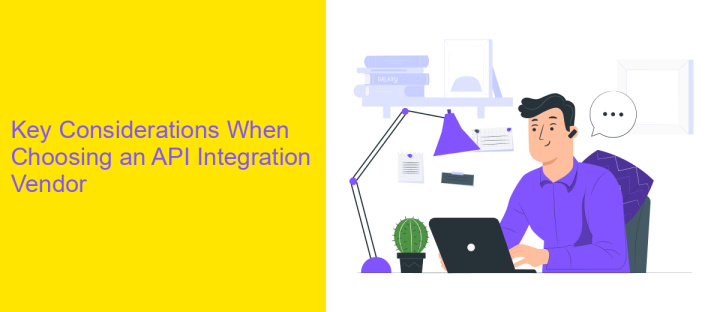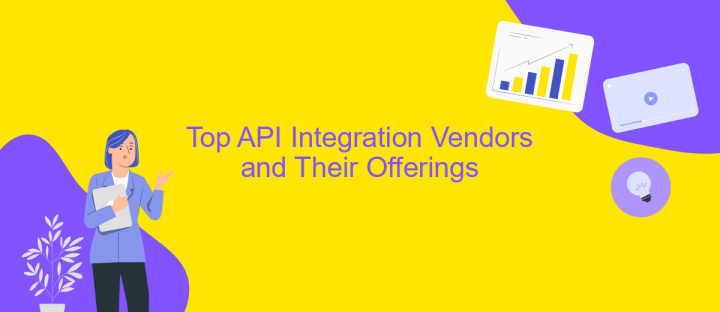API Integration Vendors
In today's rapidly evolving digital landscape, businesses are increasingly relying on seamless connectivity to drive efficiency and innovation. API integration vendors play a crucial role in this ecosystem by providing the tools and platforms necessary to connect disparate systems and applications. These vendors enable organizations to streamline operations, enhance data sharing, and foster collaboration, ultimately paving the way for more agile and responsive business processes.
Understanding API Integration Vendors
API integration vendors play a crucial role in enabling seamless communication between different software systems. These vendors provide tools and services that help businesses connect their applications, automate workflows, and enhance data exchange. Choosing the right vendor can significantly impact the efficiency and scalability of your operations. Understanding the offerings and capabilities of these vendors is essential for making informed decisions.
- Service Scope: Evaluate the range of services offered, from basic API connectors to advanced integration platforms.
- Scalability: Consider whether the vendor can support your growth and handle increased data loads.
- Security: Ensure that the vendor adheres to robust security standards to protect your data.
- Customization: Look for vendors that offer customization options to tailor integrations to your specific needs.
- Support: Assess the level of customer support and resources available for troubleshooting and guidance.
By thoroughly evaluating these factors, businesses can select an API integration vendor that aligns with their strategic goals and technical requirements. This decision can lead to improved operational efficiency, better data management, and ultimately, a competitive advantage in the market.
Key Considerations When Choosing an API Integration Vendor

When selecting an API integration vendor, it's crucial to evaluate the vendor's compatibility with your existing systems. Ensure that the vendor supports the APIs and platforms you currently use or plan to adopt. This compatibility minimizes integration challenges and reduces the need for extensive custom development. Additionally, assess the vendor's scalability to accommodate future growth. As your business expands, your integration needs will evolve, and a scalable solution will allow you to adapt without significant disruptions.
Another key consideration is the vendor's support and reliability. Look for vendors like ApiX-Drive, which offer robust customer support and comprehensive documentation to facilitate seamless integration. Reliable support can be invaluable in troubleshooting issues quickly, minimizing downtime. Furthermore, consider the vendor's security measures. Data protection is paramount, so ensure the vendor complies with industry standards and regulations to safeguard your information. By prioritizing these factors, you can choose an API integration vendor that aligns with your business objectives and ensures a smooth, secure integration process.
Top API Integration Vendors and Their Offerings

API integration is essential for businesses looking to streamline operations and enhance connectivity. Choosing the right vendor is crucial for achieving seamless integration. Leading vendors offer comprehensive solutions that cater to diverse business needs, ensuring scalability and flexibility.
- MuleSoft: Known for its Anypoint Platform, MuleSoft provides a unified solution for API management and integration, offering robust tools for designing, building, and managing APIs.
- Zapier: Zapier specializes in automating workflows, allowing businesses to connect apps and automate tasks without coding, making it ideal for non-technical users.
- Apigee: As part of Google Cloud, Apigee offers a powerful API management platform that supports full lifecycle API management, analytics, and security.
- IBM API Connect: IBM's solution provides comprehensive API lifecycle management, including creation, testing, and deployment, with strong security and analytics features.
- Microsoft Azure API Management: This service enables enterprises to publish, secure, and analyze APIs, supporting hybrid and multi-cloud environments.
These vendors provide diverse offerings to address various integration challenges. Selecting the right API integration vendor involves evaluating specific business requirements, scalability options, and the level of support provided. Each vendor brings unique strengths, making it essential for businesses to align their choice with strategic goals and technical needs.
Benefits of Using an API Integration Vendor

In today's digital landscape, leveraging API integration vendors has become essential for businesses seeking seamless connectivity and enhanced operational efficiency. These vendors offer specialized tools and expertise that streamline the process of integrating various software systems, enabling companies to focus on their core competencies without getting bogged down by technical complexities.
API integration vendors provide a robust framework for connecting disparate applications, ensuring data consistency and reducing manual intervention. By outsourcing this critical function, businesses can accelerate time-to-market, improve scalability, and enhance overall productivity. Moreover, these vendors stay updated with the latest technological advancements, ensuring that integrations are secure, reliable, and compliant with industry standards.
- Cost Efficiency: Reduces the need for in-house development resources.
- Scalability: Easily adapts to growing business needs.
- Expert Support: Access to specialized knowledge and troubleshooting.
- Security: Ensures data protection and compliance with regulations.
- Flexibility: Supports a wide range of applications and platforms.
Choosing the right API integration vendor can be a strategic advantage, allowing businesses to innovate rapidly and respond to market demands with agility. By entrusting integration tasks to experts, companies can unlock new opportunities, foster collaboration, and drive growth in an increasingly interconnected world.


Future Trends in API Integration
As we look toward the future of API integration, several trends are poised to reshape how businesses connect and automate their digital ecosystems. One significant trend is the increasing adoption of AI-driven integration platforms. These platforms leverage machine learning to optimize data flow and predict integration needs, making processes more efficient and responsive to changes. Additionally, real-time data processing is becoming a standard expectation, enabling businesses to make quicker, data-driven decisions.
Another trend is the growing importance of low-code and no-code integration solutions, which empower non-technical users to build and manage integrations with minimal effort. Services like ApiX-Drive are at the forefront of this movement, offering user-friendly interfaces that simplify the integration process. As businesses continue to prioritize flexibility and scalability, the demand for such intuitive tools will likely surge. Furthermore, the emphasis on security and compliance in API integrations will intensify, driving the development of more robust security protocols and practices. These trends collectively point to a future where API integration is more accessible, efficient, and secure than ever before.
FAQ
What is API integration and why is it important?
How can businesses benefit from using API integration vendors?
What should I consider when choosing an API integration vendor?
How can I ensure the security of my data during API integration?
Can API integration vendors help with automating business processes?
Apix-Drive will help optimize business processes, save you from a lot of routine tasks and unnecessary costs for automation, attracting additional specialists. Try setting up a free test connection with ApiX-Drive and see for yourself. Now you have to think about where to invest the freed time and money!

